Featured
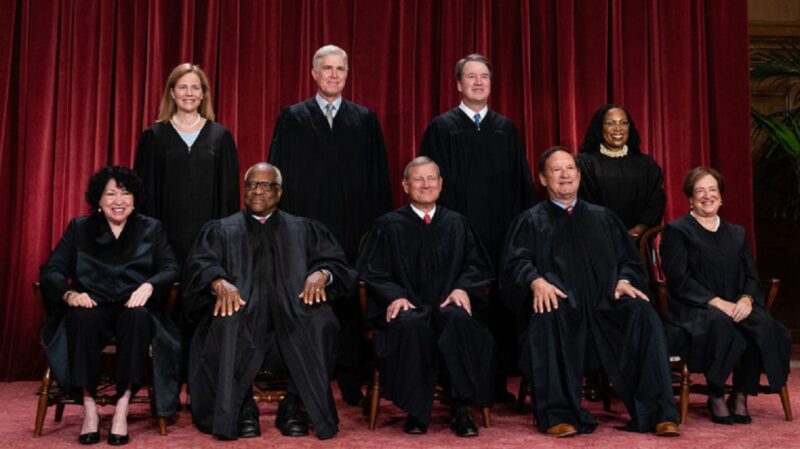 The Supreme Court Wants to Move on From Racism Already. By Pema Levy / Mother Jones
The Supreme Court Wants to Move on From Racism Already. By Pema Levy / Mother Jones
The justices pondered bailing on affirmative action, campus diversity, and the goal of equality.
The conservative Supreme Court appears poised to ban the use of race in college admissions. During five hours of oral arguments on Monday in two affirmative action cases, all six conservative justices were skeptical of using race as a factor in college admissions. The cases invite the conservatives to rule that using race in any way is an affront to the Constitution and a form of discrimination against white people.
The effects of locking minority students out of elite universities are no secret. These schools serve as pipelines to leadership in government, politics, and private business. They lead to higher incomes and economic mobility. Significantly, affirmative action programs are crucial to giving people of color these opportunities. This has been proven in the places where affirmative action has already been banned. Read more
Related: Make No Mistake, the Supreme Court Will Kill Affirmative Action. By Elie Mystal / The Nation
Related: Asian American Students Face Bias, but It’s Not What You Might Think. By Jennifer Lee / NYT
Related: Justice Jackson’s Crucial Argument About Affirmative Action. By Adam Harris / The Atlantic
Political / Social
 The Right-Wing Mothers Fuelling the School-Board Wars. By Paige Williams / The New Yorker
The Right-Wing Mothers Fuelling the School-Board Wars. By Paige Williams / The New Yorker
Moms for Liberty claims that teachers are indoctrinating students with dangerous ideologies. But is the group’s aim protecting kids—or scaring parents?
Moms for Liberty’s role in the broader war on public schools became ever clearer in July, at the group’s inaugural national summit, in Tampa. DeSantis, who delivered a key address, was presented with a “liberty sword.” Another headliner was Trump’s former Education Secretary, Betsy DeVos, whose family has connections to Hillsdale. To an enthusiastic crowd that included Steenman, DeVos declared that the U.S. Department of Education—the agency that she once oversaw—should not exist. Moms for Liberty’s campaign, meanwhile, continues to widen. The organization now claims two hundred and forty chapters in forty-two states, and more than a hundred thousand members. It has thrown a fund-raising gala, featuring Megyn Kelly, in which the top ticket cost twenty thousand dollars. In late October, a spokesperson for the Moms told me that the organization—ostensibly a charity—is a “media company.” Read more
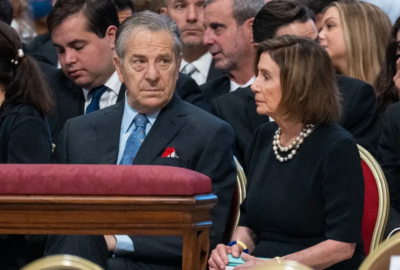 The Pelosi attack was long foretold — and make no mistake, Republicans are thrilled. By Chauncey Devega / Salon
The Pelosi attack was long foretold — and make no mistake, Republicans are thrilled. By Chauncey Devega / Salon
Hours after a MAGA supporter attacked Paul Pelosi with a hammer, Donald Trump bemoaned his “torment and oppression”
Among Republicans, Nancy Pelosi is one of the most hated people in American public life. Polls and other research suggests that Trump followers and other Republicans have now embraced political violence — including the Jan. 6 attack, and potentially worse things than that — as an acceptable tactic for obtaining and keeping political power. For decades, Republicans, the “conservative” movement and the larger right wing have made no secret of what they intend to do in their revolutionary struggle against America’s multiracial, pluralistic democracy. For the most part, the Democrats, the media, the political class and too many members of the public chose to ignore those threats, or to convince themselves that all this was just “hyperbole” and overheated rhetoric. At this point, ignoring the right’s threats of violence can only be understood as a deliberate choice, or even a surrender. Read more
Related: If today’s GOP baffles you, consider what motivates its base. By Jennifer Rubin / Wash Post
 Kemp, Abrams race: Takeaways from second Georgia governor debate. By Nikolai Mather / USA Today
Kemp, Abrams race: Takeaways from second Georgia governor debate. By Nikolai Mather / USA Today
Georgia gubernatorial candidates Stacey Abrams and Brian Kemp compared legislative records and critiqued plans for the future of Georgia in a debate Sunday in Atlanta.
Moderated by WSB-TV news anchor Justin Farmer, the hour-long session was the second and final debate ahead of the 2022 midterms. Both candidates repeated talking points from their previous debate, which covered topics like education and health care access. Abrams and Kemp also revisited inflation, law enforcement and crime. But they also treaded new ground, particularly around affordable housing, voter integrity and inflation. Kemp talked more candidly about supporting Georgia’s new abortion restrictions, which includes a six-week abortion ban, while Abrams addressed Georgia’s gun laws and their effects on business and safety, referencing the cancellation of Music Midtown and the 2021 Atlanta spa shootings. Read more
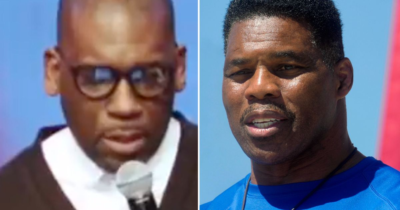 Atlanta Preacher Gives Herschel Walker the Business in Fiery Sunday Sermon. By Brooke leigh Howard / The Daily Beast
Atlanta Preacher Gives Herschel Walker the Business in Fiery Sunday Sermon. By Brooke leigh Howard / The Daily Beast
“Y’all ain’t ready for me today.” That’s how the raucous crowd listening to Atlanta-area pastor Jamal Bryant knew he was on one during his fiery sermon on Sunday, one in which he did not exactly practice pure separation between church and state. Instead, Bryant told the faithful at Newbirth Missionary Baptist what he thought about GOP Senate nominee Herschel Walker. Read more and watch here
 Ted Budd and Cheri Beasley face off in NC Senate contest. By Claudia Grisales / NPR
Ted Budd and Cheri Beasley face off in NC Senate contest. By Claudia Grisales / NPR
This combination of photos shows North Carolina Democratic Senate candidate Cheri Beasley on Aug. 29 in Durham, N.C., left, and Republican candidate Rep. Ted Budd, R-N.C., on Sept. 25 in Mount Airy, N.C.
The GOP is facing one of its closest Senate contests in the country. The historic Democratic nomination of Cheri Beasley, the former chief justice of the North Carolina Supreme Court, has boosted supporters’ hopes of turning the seat blue. Beasley has also put up strong polling numbers, trailing Budd but within the margin of error in some polls.To reach that critical constituency, Beasley is meeting voters at churches around the state. She has also been boosted by a “souls to the polls” effort to get church goers to ballot box. Read more
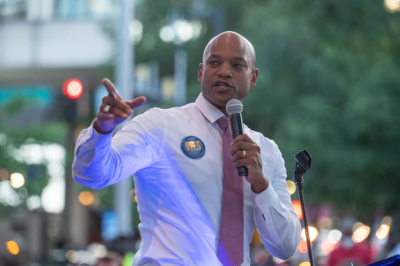 Wes Moore tried to run away from military school. It changed his life instead. By Sydney Trent / Wash Post
Wes Moore tried to run away from military school. It changed his life instead. By Sydney Trent / Wash Post
Moore, heavily favored to become Maryland’s first Black governor, was transformed by Valley Forge Military Academy — a place he begged his mother not to send him
Between 1991 and 1998, Moore — one of just a handful of Black students on the all-male campus — would rise from a miserable middle school plebe to a widely admired first captain in command of the roughly 800 cadets at the academy and junior college. He would go on to become a Rhodes Scholar, White House fellow, investment banker, Army paratrooper and officer in Afghanistan, and chief executive for one of the nation’s largest poverty-fighting nonprofits before winning Maryland’s Democratic gubernatorial nomination earlier this year in his first bid for elective office. Read more
 Latino voters at heart of Nevada 2022 campaigns. By Susan Davis / NPR
Latino voters at heart of Nevada 2022 campaigns. By Susan Davis / NPR
Progressive Activist LaLo Montoya knocks on a door in a Las Vegas apartment complex to help get out the vote ahead of Election Day
Republican candidates are in a dead heat with Democratic incumbents for governor, Senate, House and several statewide offices in large part by making fresh inroads with Latino voters. In the final days of the 2022 campaign, Nevada is proving to be the most competitive state in the country. Latinos in Nevada historically vote Democratic. Donald Trump won 35% of the Latino vote here in 2020, and lost the state by about 2 points. However, small inroads with this voting bloc by Republicans could swing tight races in their favor. Read more
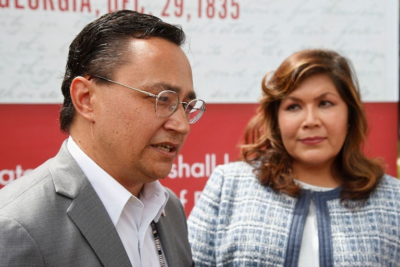 Cherokee Nation Is Fighting for a Seat in Congress. By Gabriel Pietrorazio / The New Republic
Cherokee Nation Is Fighting for a Seat in Congress. By Gabriel Pietrorazio / The New Republic
Thanks to an 1835 treaty, they’re pushing Democrats to approve a nonvoting delegate.
Now, nearly two centuries later, the Cherokee Nation is trying to revive one of the few concessions its ancestors were able to secure in the Treaty of New Echota: the promise of congressional representation. “So many of my predecessors were trying to rebuild the Nation or keep us from dissolving in the face of great oppression and great obstacles,” says Principal Chief Chuck Hoskin Jr., who holds the same leadership title tracing back to Ross. Read more
 Jewish leaders call on GOP candidates to reject antisemitic comments. By Hannah Knowles , Colby Itkowitz, and Isaac Arnsdorf / Wash Post
Jewish leaders call on GOP candidates to reject antisemitic comments. By Hannah Knowles , Colby Itkowitz, and Isaac Arnsdorf / Wash Post
A series of bigoted remarks from Republican candidates’ associates or supporters have alarmed Democrats and Jewish advocacy groups.
“We are in a particular time in our country where bigotry like antisemitism is being normalized, where people can make statements and there are no real repercussions in the political sphere,” said Marilyn Mayo, a senior research fellow at the Anti-Defamation League’s Center on Extremism. A Twitter user with the handle “LaxaltStan,” who at one point identified himself as a GOP political operative named Michael Pecjak, described Jewish people as part of “a cult”; retweeted an image of the words “I hate” and “Jews”; and suggested they were unhappy with a Breitbart editor’s comment that the right-wing website is “pro-Jewish with a reputation for treating women and minorities well.” Read more
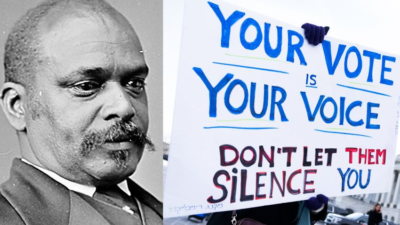 My family taught me ‘the act of voting is democracy made manifest.’ By Elizabeth Alexander / CNN
My family taught me ‘the act of voting is democracy made manifest.’ By Elizabeth Alexander / CNN
What one man’s life and death can teach us about the fight for the Black vote
On Tuesday, November 8, we will head to the polls to vote in our country’s midterm elections. More than 235 million of us will be eligible to participate in this exercise fundamental to sound governance of the United States, but data on elections in midterm years past suggest that only about half that number are likely to cast a ballot. Concerns about election safety, frustration over gerrymandering, and despair over federal and state sieges on the right to vote have led many to question if it’s worth voting at all. You yourself may have already concluded, when considering these challenges to American suffrage, that whether or not you vote ultimately does not matter. It does matter. Read more
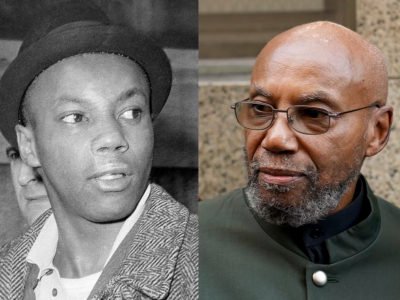 Men exonerated in Malcolm X killing to receive $36 million. By AP and NPR
Men exonerated in Malcolm X killing to receive $36 million. By AP and NPR
This combination photo shows Muhammad Aziz, a suspect in the slaying of Malcolm X, after his arrest, in New York, on Feb. 26, 1965, left, and Aziz outside court after his conviction in the killing of Malcolm X was vacated on Nov. 18, 2021, in New York.
“Muhammad Aziz, Khalil Islam, and their families suffered because of these unjust convictions for more than 50 years,” said Shanies said in an email. “The City recognized the grave injustices done here, and I commend the sincerity and speed with which the Comptroller’s Office and the Corporation Counsel moved to resolve the lawsuits.” Shanies said the settlements send a message that “police and prosecutorial misconduct cause tremendous damage, and we must remain vigilant to identify and correct injustices.” Read more
Ethics / Morality / Religion
 Black, Christian and Transcending the Political Binary. By Tish Harrison Warren / NYT
Black, Christian and Transcending the Political Binary. By Tish Harrison Warren / NYT
Justin Giboney is a lawyer and political strategist in Atlanta who grew up in the Black church. He says his theological foundation came from his grandfather, who was a bishop in a Black Pentecostal denomination. Giboney is also the president and a co-founder of the AND Campaign, a Christian civic organization meant to represent people of faith who do not fit neatly into either political party.
As we approach the midterms, Giboney graciously agreed to speak with me about the state of our politics from the perspective of a person of faith who is also a person of color — what it’s like to embrace traditional Christian theology while also opposing the political stances of many white evangelicals, and what it’s like to be committed to social justice in ways that differ from those of many secular progressives. This interview has been edited for clarity and concision. Read more
 Christian Nationalism Debates Expose Clashing Views of Power. By Daniel Silliman / Christianity Today
Christian Nationalism Debates Expose Clashing Views of Power. By Daniel Silliman / Christianity Today
As American evangelicals head to the polls, they disagree about the meaning of the contested phrase.
Caleb Campbell didn’t know he needed the term Christian nationalism. He’d heard it, here and there, but it hadn’t really registered. It was at the edge of his awareness and his vocabulary as he tried to understand the disputes over racism, the pandemic, and the election that rocked his evangelical church in suburban Phoenix throughout 2020. Then the new year started, a mock gallows was erected at the Capitol, and his social media showed some in the mob carried signs that said, “JESUS SAVES.” “I needed that phrase to name it,” said Campbell, pastor of Desert Springs Bible Church. “This is a heresy. It’s a complete distortion of Jesus’ doctrine of power. I think Christian nationalism started in the Garden of Gethsemane when Jesus was reaching for the Cross, and Peter, who loves Jesus, thought he should protect him with a sword.” Read more
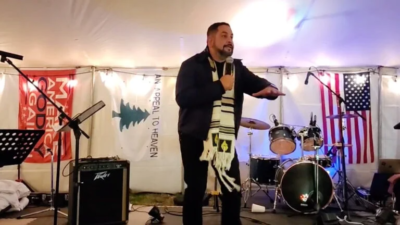 Ahead of midterms, faith plays central role in Republican efforts to win Latino votes. By Alejandra Molina / RNS
Ahead of midterms, faith plays central role in Republican efforts to win Latino votes. By Alejandra Molina / RNS
Pew Research Center data looking at 2022 midterm election preferences of Latinos shows that some of the sharpest differences in candidate choice are by religion.
Pastor Luis Cabrera, who leads City Church Harlingen in South Texas, foresees a “godly wave” in next week’s midterm elections, particularly in his home state, where he has acted as a spiritual guide to a group of Latina Republicans seeking to flip congressional seats with a message of faith, family and country. Values, they say, that are central to Latino voters. Values, they believe, that Democrats have abandoned. Read more
 “They cannot survive without fear”: A heretic on leaving the evangelical church. By Amanda Marcotte / Salon
“They cannot survive without fear”: A heretic on leaving the evangelical church. By Amanda Marcotte / Salon
In “Heretic,” Jeanna Kadlec writes of the hard but necessary journey of escaping fundamentalist Christianity
I was leaving the Garden, the evangelical church, and the only version of myself that I had ever known. I was choosing who I wanted to be — but I had no idea who she was.” In her new book, “Heretic,” writer and self-declared “recovering academic” Jeanna Kadlec weaves her personal experiences walking away from the faith of her youth with a larger meditation on the larger social and political damage wrought on the U.S. by the popularity of evangelical Christianity. In an era when the hardcore Christian set’s hunger for power leads them to back faux-repentant sleazes like Donald Trump and Herschel Walker, that’s an even greater need for her insights about how this religion wields so much control over its followers. Read more
Historical / Cultural
 This was the worst slaughter of Native Americans in U.S. history. Few remember it. By Dana Hedgpeth / Wash Post
This was the worst slaughter of Native Americans in U.S. history. Few remember it. By Dana Hedgpeth / Wash Post
The 1863 Bear River Massacre decimated the Northwestern Band of the Shoshones but was overshadowed by the Civil War. Darren Parry, the former chairman of the Northwestern Band of the Shoshone Nation, overlooks the site of the Bear River Massacre where the soldiers in the U.S. Army killed more than 350 of his ancestors in 1863.
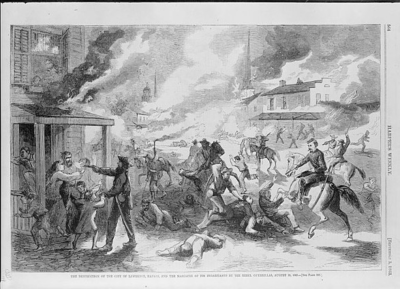 Where Will This Political Violence Lead? Look to the 1850s. By Joshua Zeitz / Politico
Where Will This Political Violence Lead? Look to the 1850s. By Joshua Zeitz / Politico
In the mid-19th century, a pro-slavery minority — encouraged by lawmakers — used violence to stifle a growing anti-slavery majority. It wasn’t long before the other side embraced force as a necessary response. Shown is the destruction of the city of Lawrence, Kansas, and the massacre of its inhabitants by the Rebel guerrillas, August 21, 1863. Quantrill’s Raid. | Wikimedia Commons
Today’s events bear uncanny resemblance to an earlier decade — the 1850s, when Southern Democrats, the conservatives of their day, unleashed a torrent of violence against their opponents. It was a decade when an angry and entrenched minority used force to thwart the will of a growing majority, often with the knowing support and even participation of prominent elected officials. That’s the familiar part of the story. The less appreciated angle is how that growing majority eventually came to accept the proposition that force was a necessary part of politics. Read more
 Proposed amendment could remove Jim Crow-era language in Alabama Constitution. By Kim Chandler / PBS
Proposed amendment could remove Jim Crow-era language in Alabama Constitution. By Kim Chandler / PBS
The Alabama Constitution, approved in 1901 to entrench white supremacy, still has language regarding segregated schools, poll taxes and bans on interracial marriage.
But a seismic change could be in store. Alabama voters on Nov. 8 will decide whether to ratify a new constitution that strips out the Jim Crow-era language. It would also reorganize the unwieldy governing document, which has been amended 978 times and tops over 400,000 words. The Public Affairs Research Council of Alabama says the size makes it the longest such document in the world. Read more
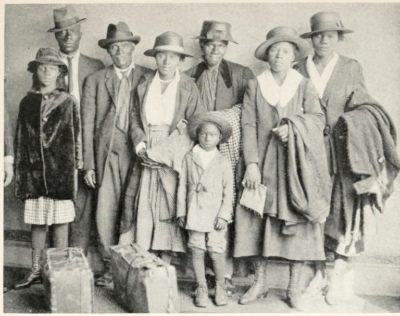 The Culture and Intellectual Climate of the Great Migration. By Joseph R. Stewart / AAIHS
The Culture and Intellectual Climate of the Great Migration. By Joseph R. Stewart / AAIHS
Scott and Violet Arthur arrive with their family at Chicago’s Polk Street Depot on Aug. 30, 1920, two months after their two sons were lynched in Paris, Texas (Wikimedia Commons/ Chicago Defender)
A Movement in Every Direction: A Great Migration Critical Reader is a helpful collection of primary and secondary sources related to the exodus of Black southerners to cities in the Urban North, West, and American South. Moving beyond what might be seen as “typical” sources, A Movement in Every Direction asks readers and teachers to think deeply and critically about the texts they define as essential for understanding the Great Migration. It also demonstrates how the Great Migration continues to live on in the posterity of people who migrated. Read more
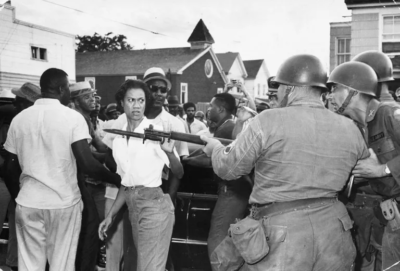 Was life better for us before integration? Check the stats. By Asward Walker / Defender
Was life better for us before integration? Check the stats. By Asward Walker / Defender
Gloria Richardson and protestors facing National Guard troops, Cambridge Maryland ca 1963. Photo courtesy of the National Museum of African American History and Culture.
One of the most common refrains from Blackfolk upwards of 50 years old, and even some of their children, is that life was better for us before integration. Still, others say such thinking over-glorifies the past while ignoring the gains we’ve enjoyed by no longer being restricted by laws based on a racist color line. But if you go to any barbershop, attend any family reunion or find yourself in a conversation where two or more Blackfolk are gathered, at some point at least one person will say, and 90% of the folk gathered will agree, “Life was better for us before integration.” And then they’ll break down all the reasons. Read more
 Alana Mayo may be the new face of Hollywood star-makers. By Neda Ulaby / NPR
Alana Mayo may be the new face of Hollywood star-makers. By Neda Ulaby / NPR
Alana Mayo speaks at the Austin Convention Center on March 14, 2022, in Austin, Texas.
Alana Mayo is 38 years old. She’s Black, queer and a movie industry trailblazer who took over Orion Pictures in 2020. The storied studio once produced such movies as Platoon, Dances With Wolves and the Silence of the Lambs, but it went bankrupt in 1991, was bought by MGM and more or less languished. Mayo’s job is to revive it — right when the entire industry is in massive upheaval — but she seems undaunted. “The most [satisfying] part of my job is getting to make the kinds of movies I want to make inside of the Hollywood system,” she told NPR during an interview at her sunny hillside home in Los Angeles. Read more
 Diddy Replaces Kanye West On List Of 2022’s Wealthiest Hip Hop Artists, Becomes Billionaire. By Paul Meara / BET
Diddy Replaces Kanye West On List Of 2022’s Wealthiest Hip Hop Artists, Becomes Billionaire. By Paul Meara / BET
Ye’s net worth has dropped dramatically since recent public statements disparaging George Floyd, Jewish people, and more.
Additionally, Jay-Z remains in his spot as the wealthiest Hip Hop artist in North America, with a $1.5 billion net worth. Earlier this year, Ye was in second place on the list of Hip Hop’s highest earners with $250 million in earnings for 2021, but after his deal with Adidas was severed over his anti-Semitic comments, he’s slipped to third. At one point this year, ‘Ye was reportedly worth $2 billion. Now Diddy has the second-place spot after previously trailing the Chicago-based rapper. Kanye West’s net worth is now estimated to be around $500 million, with the loss of his Adidas deal becoming the most significant contributor to his decline. Ironically, he and Diddy briefly feuded on Instagram earlier this month after Ye wore a “White Lives Matter” t-shirt during Paris Fashion Week. Read more
 Rihanna Returns To Music With ‘Lift Me Up’ From ‘Black Panther: Wakanda Forever.’ By Chris Malone Mendez / Forbes
Rihanna Returns To Music With ‘Lift Me Up’ From ‘Black Panther: Wakanda Forever.’ By Chris Malone Mendez / Forbes
Rihanna shocked millions of fans worldwide last month when she confirmed that she would be headlining the Super Bowl LVII halftime show this coming February. After her Super Bowl announcement, speculation that she had an album and a tour on the way in 2023 ramped up. Today, Rihanna fans get their wish, as the Grammy-winning singer releases her first solo song in six years, the moving ballad “Lift Me Up” from Black Panther: Wakanda Forever, Marvel’s latest blockbuster in theaters November 11. Read more
Sports
 Kyrie Irving and the Fraught History of Our Collective Liberation. By Dave Zirin / The Nation
Kyrie Irving and the Fraught History of Our Collective Liberation. By Dave Zirin / The Nation
Kyrie’s anti-Semitism isn’t new, but his allies are. And that’s terrifying.
Thanks to Jeff Bezos, Kyrie Irving is using his giant NBA platform to promote a movie available on Amazon that luxuriates in the heat of anti-Semitism like Steve Bannon at a cross burning. The film, Hebrews to Negroes, promotes the idea that the Holocaust—which affected my family intimately—was a lie. It promotes the idea of a link between us modern Jews and Satan worship. It includes quotes attributed to Adolf Hitler about how fraudulent modern Jews are—we aren’t “real Jews.” We are apparently instead focused on world domination. (For what it’s worth, I’ve never understood why, if Jews are set on world domination, I’ve never been invited to any of the meetings.) Read more
Related: Kyrie Irving needs to answer for promoting antisemitism. By Jesse Washington / Andscape
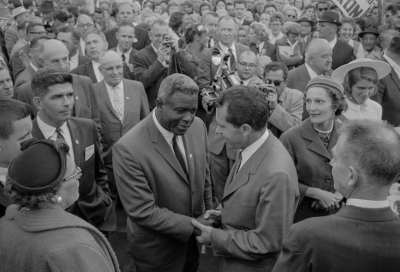 Kennedy and Nixon Both Wooed Jackie Robinson. Guess Who Won. By Frederic J. Frommer / Politico
Kennedy and Nixon Both Wooed Jackie Robinson. Guess Who Won. By Frederic J. Frommer / Politico
The baseball legend was courted by both presidential candidates. His choice would torment him for years. Shown is then-Vice President Richard Nixon who shakes hands with Jackie Robinson in Plainfield, N.J. on Oct. 4, 1960, where Nixon was campaigning. | Henry Griffin/AP Photo
In the summer of 1960, Jackie Robinson was one of the most prominent ex-athletes in America. He had retired after the 1956 season but was still hugely popular, having broken baseball’s color barrier 13 years earlier. And he had a decision to make: Who was he going to back in the presidential election that fall? Robinson’s endorsement was so valuable that both John F. Kennedy and Richard Nixon personally courted him. And in turn, the baseball icon vetted each candidate, hard. As the election approached, he met with both men on the same day, a kind of job interview for his support. Read more
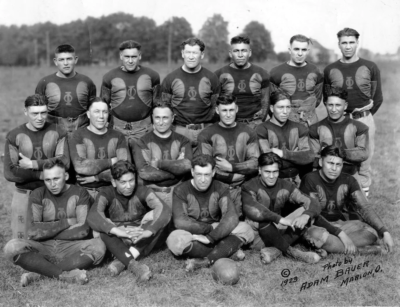 An all-Native American NFL team was founded 100 years ago — to promote a dog kennel. By Dana Hedgpeth / Wash Post
An all-Native American NFL team was founded 100 years ago — to promote a dog kennel. By Dana Hedgpeth / Wash Post
The Oorang Indians played a century before the Washington Football Team rebranded following its controversial Native American-derived name. Shown are the Oorang Indians who played in the NFL in 1922-1923 and had all Native American players, including Olympic star Jim Thorpe, third from left in back row, as a player-coach. (Adam Bauer/Courtesy of Cumberland County Historical Society in Pennsylvania)
Site Information
Articles appearing in the Digest are archived on our home page. And at the top of this page register your email to receive notification of new editions of Race Inquiry Digest.
Click here for earlier Digests. The site is searchable by name or topic. See “search” at the top of this page.
About Race Inquiry and Race Inquiry Digest. The Digest is published on Mondays and Thursdays.
Use the customized buttons below to share the Digest in an email, or post to your Facebook, Linkedin or Twitter accounts.